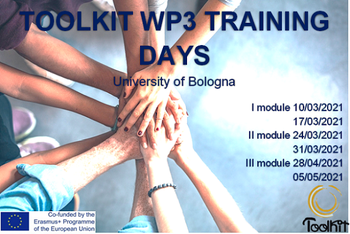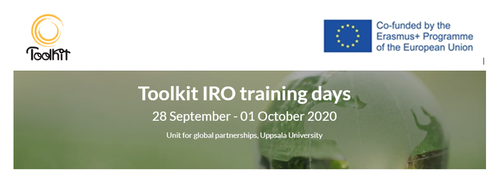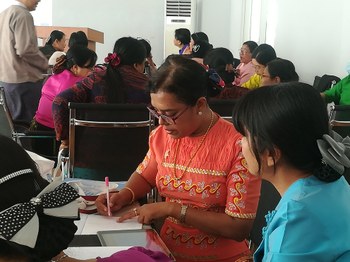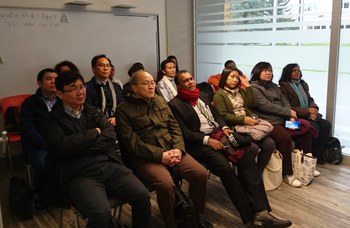WP3- Training on Project Design and Management
On March 10th 2021, TOOLKIT Consortium met on Zoom Platform to attend the first session of WP3 Training on Project Design and Management delivered by UNIBO with the contribution of Mr. James Kennedy, TOOLKIT project advisor.
The training was divided in 3 didactic modules (2 days each) and has been carried out as follows:
I module: 10-17 March 2021
II module: 24-31 March 2021
III module: 28 April 5 May 2021
The event of March 10th opened the first didactic module and started with the welcoming session of Ms. Giovanna Filippini (Project Coordinator) followed by the introduction of the session contents held by Filippo Sartor (UNIBO -TOOLKIT Coordination Team).
After an ice breaking poll on motivation and expectation of participants, the audience assisted to the presentation on Why external competitive funding or project opportunities may be relevant for universities? by Filippo Sartor (UNIBO) who proposed a taxonomy for the classification of international projects in terms of donors, actions and budget. The presentation served as background information for the work to be implemented by the project’s Asian partners who, divided in groups, started to work on the classification of 2 projects they carried out in their institutions, following the taxonomy provided.
The event continued with the exposure by Mr. James Kennedy (TOOLKIT Project advisor) of the presentation: Main actors and donors to support university initiatives in Toolkit partner country region. Mr. Kennedy gave an interesting and punctual overview of the main actors and funding bodies operating in the region.
After a short break, participants assisted to Mr. Sartor (UNIBO) introduction on the Analysis of calls and external opportunities, giving hints on definitions, main documents, key information and features of a call. Participants have been asked to fill out a call fiche exercise considering the info provided by Mr. Sartor presentation. The task was then completed by all the participants as an assignment for the following week and served as the starting point of the second session of the module which took place on March 17th.
The second session of TOOLKIT WP3 training was successfully conducted on March 17th 2021 through Zoom platform. The session started with Mr. James Kennedy’s presentation focusing on how to identify and adopt criteria to evaluate the participation to project proposals. The first part of the session was concluded by an exercise: participants, divided in groups, have been asked to analyse two short project descriptions according to their own needs and to identify if these project proposals may fit with their organisation and if they could be improved adopting a more collaborative approach.
During the second part of the session, trainees assisted to the presentation held by Mr. Filippo Sartor Matching external and internal factors: from a project idea to actual first draft aimed at giving to the audience some theory and hints on the main aspect to take into account when drafting a concept note.
The session was concluded by leaving an assignment to all the participants: according to a set of calls for proposals offered each group prepared a first concept note of their own idea. At the same time, the groups discussed criteria to identify possible partners. Participants were left with the assignment of completing the concept note within a week.
The second module of TOOLKIT WP3 Training started on March 24th 2021, on Zoom platform.
The session started with the presentation held by Mrs. Valentina Manzato (UNIBO TOOLKIT Coordination Team) who started the exposure of Techniques for project writing and design: The Logical Framework Matrix. After the presentation participants, divided in groups have been asked to fill in the first column of the Logical Framework Matrix based on the project idea they had drafted in the concept note prepared during the first training module.
After a short discussion on the outcomes of the exercise, Ms. Livia Mercatelli (UNIBO Coordination Team) guided the participants through the other part of the LFM focusing on Objectively Verifiable Indicators and their measurement. As an assignment for March 31st session participants have been asked to fill in the first 3 columns of the LFM.
On March 31st 2021 Toolkit consortium met on Zoom for the last session of WP3 II module online training. This time the day started with the presentations by Asian Partner Universities describing the work done in filling out the LFM. After each presentation participants discussed together about the proposed LFM giving feedback and suggestions. After a short break, the day continued with the presentation held by Ms. Valentina Manzato (UNIBO Coordination Team) Techniques for project writing and design focusing on the organization of the activities through work packages. Following the floor has been left to Ms. Livia Mercatelli (UNIBO Coordination Team) who presented: From theory to practice – The Narrative Part – Describing project activities.
On April 28th the third and last module of TOOLKIT WP3 Training started through Zoom platform. The first didactic module started with an opening session by Mrs. Romina Kniaz, which provided a brief introduction on the main topic of the day: The Main aspects of project management.
Before starting the main presentation, Mrs. Barbara Lilliu (TOOLKIT Project External Evaluator) gave a brief presentation of the Quality questionnaires results (on module 1 and module 2) and on how the feedback has been considered to organize the last module. The trainee’s satisfaction was overall positive: according to the participants the training objectives were clear, the course contents were illustrated with good examples, providing new knowledge and practices. Participants confirmed that through the working program they were able to build several new skills, such as managing calls and funding opportunities, writing CNs, dealing with decision making process, project management, how to build a partnership and many more.
The event then proceeded with Mrs. Kniaz presentation on Project management, which was structured in two parts: the first one focusing on the Main aspects of project management, and the second one on Project management challenges. Specific case studies of risk management were presented, and the participants were involved through the use of polls in an active debate on how to deal with real-life scenarios.
After a short break, the floor was taken by Mrs. Sara Fiorentino and Mrs. Tania Chinni, from the Department of Cultural Heritage, University of Bologna. Mrs. Fiorentino and Mrs. Chinni presented to the trainees their direct experience on Sustainability of the project’s results with reference to the international projects ROCHEMP and REACH.
The day was concluded with a daily recap by Mrs. Kniaz and participants agreed to meet again for the last session of the training the following week.
The last session of the WP3 Training was successfully conducted through Zoom platform on May 5th. Mrs. Giovanna Filippini (UNIBO Project Coordinator) held the welcoming followed by the opening session of Mrs. Romina Kniaz. The floor was given to the Asian Partner Universities who presented the analysis of real challenges they encountered in the management of international projects and the solutions taken to overcome them.
After a short break, other risk managements experiences were provided by different Departments of the University of Bologna: Mrs. Paola di Marzo (Department of Industrial Engineering UNIBO) presented the challenges encountered in dealing with the equipment purchase and tendering procedure in the framework of RADIUM Project , Mrs. Romina Kniaz (UNIBO International Relations Divisions) presented the challenges faced with B- International, an E+ CBHE Project coordinated by Cardiff Metropolitan University and finally Mrs. Sara Fiorentino and Mrs. Tania Chinni (Department of Cultural Heritage, UNIBO) discussed the problems encountered in managing REACH and ROCHEMP projects and how they have been solved. Finally, at the end the session, daily and final remarks were given on the module and the training was successfully concluded.
Please have a look at the box below for training materials.




